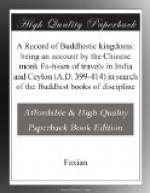(13) Meaning, as explained in Chinese, “a tree without knots;” the ficus Indica. See Rhys Davids’ note, Manual, p. 39, where he says that a branch of one of these trees was taken from Buddha Gaya to Anuradhapura in Ceylon in the middle of the third century B.C, and is still growing there, the oldest historical tree in the world.
(14) See chap. xiii, note 11.
I have not met with the account of this
presentation. See the long
account of Prajapati in M. B., pp. 306-315.
(15) See chap. xx, note 10. The Srotapannas are the first class of saints, who are not to be reborn in a lower sphere, but attain to nirvana after having been reborn seven times consecutively as men or devas. The Chinese editions state there were “1000” of the Sakya seed. The general account is that they were 500, all maidens, who refused to take their place in king Vaidurya’s harem, and were in consequence taken to a pond, and had their hands and feet cut off. There Buddha came to them, had their wounds dressed, and preached to them the Law. They died in the faith, and were reborn in the region of the four Great Kings. Thence they came back and visited Buddha at Jetavana in the night, and there they obtained the reward of Srotapanna. “The Life of the Buddha,” p. 121.
(16) See the account of this event in M. B., p. 150. The account of it reminds me of the ploughing by the sovereign, which has been an institution in China from the earliest times. But there we have no magic and no extravagance.
(17) “The place of Liberation;” see chap. xiii, note 7.
(18) See the accounts of this event
in M. B., pp. 145, 146; “The Life
of the Buddha,” pp. 15, 16;
and “Buddhist Birth Stories,” p. 66.
(19) There is difficulty in construing the text of this last statement. Mr. Beal had, no doubt inadvertently, omitted it in his first translation. In his revised version he gives for it, I cannot say happily, “As well as at the pool, the water of which came down from above for washing (the child).”
(20) See chap. xvii, note 8. See also Davids’ Manual, p. 45. The latter says, that “to turn the wheel of the Law” means “to set rolling the royal chariot wheel of a universal empire of truth and righteousness;” but he admits that this is more grandiloquent than the phraseology was in the ears of Buddhists. I prefer the words quoted from Eitel in the note referred to. “They turned” is probably equivalent to “They began to turn.”
(21) Fa-hien does not say that he himself saw any of these white elephants, nor does he speak of the lions as of any particular colour. We shall find by-and-by, in a note further on, that, to make them appear more terrible, they are spoken of as “black.”
CHAPTER XXIII
RAMA, AND ITS TOPE.




